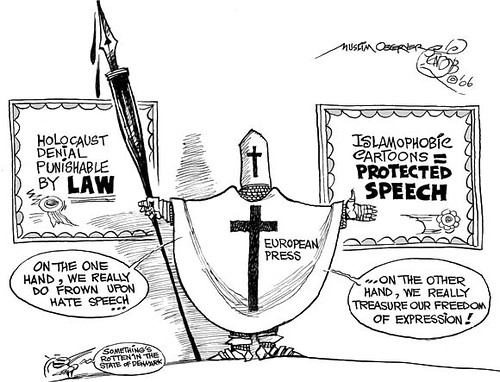F
figsfiggyfigs
Guest
The Jyllands-Posten Muhammad cartoons controversy began after 12 editorial cartoons, most of which depicted the Islamic prophet Muhammad, were published in the Danish newspaper Jyllands-Posten on 30 September 2005. The newspaper announced that this publication was an attempt to contribute to the debate regarding criticism of Islam and self-censorship. Danish Muslim organizations that objected to the depictions responded by holding public protests attempting to raise awareness of Jyllands-Posten's publication. Further examples of the cartoons were soon reprinted in newspapers in more than 50 other countries, further deepening the controversy.
This led to Islamic protests across the Muslim world, some of which escalated into violence with instances of firing on crowds of protestors (resulting in a total of more than 100 reported deaths),[1] including the bombing of the Danish embassy in Pakistan and setting fire to the Danish Embassies in Syria, Lebanon and Iran, storming European buildings, and burning the Danish, Dutch, Norwegian, French and German flags in Gaza City.[2][3] Various groups, primarily in the Western world, responded by endorsing the Danish policies, including "Buy Danish" campaigns and other displays of support. Danish Prime Minister Anders Fogh Rasmussen described the controversy as Denmark's worst international crisis since World War II.[4]
Critics of the cartoons described them as Islamophobic or racist,[5] and argued that they are blasphemous to people of the Muslim faith, are intended to humiliate a Danish minority, or are a manifestation of ignorance about the history of Western imperialism.
Supporters have said that the cartoons illustrated an important issue in a period of Islamic terrorism and that their publication is a legitimate exercise of the right of free speech, explicitly tied to the issue of self-censorship. They claim that Muslims were not targeted in a discriminatory way since unflattering cartoons about other religions (or their leaders) are frequently printed. [6] They question whether some of the riots were spontaneous outpourings as they took place where no spontaneous demonstrations are allowed, and whether the images of Muhammad per se are offensive to Muslims, as thousands of illustrations of Muhammad have appeared in books by and for Muslims.[7]
Do you think it's okay to offend hundreds of millions of people in the name of satire, just for the sake of doing so?
I personally don't think so, and I was pretty mad during the abovementioned controversy. I believe it in inexcusable to mock something so many people find precious and sacred. It was also a pretty stupid move by the newspaper. They must have known that the cartoons would create a big reaction in the Middle East.




